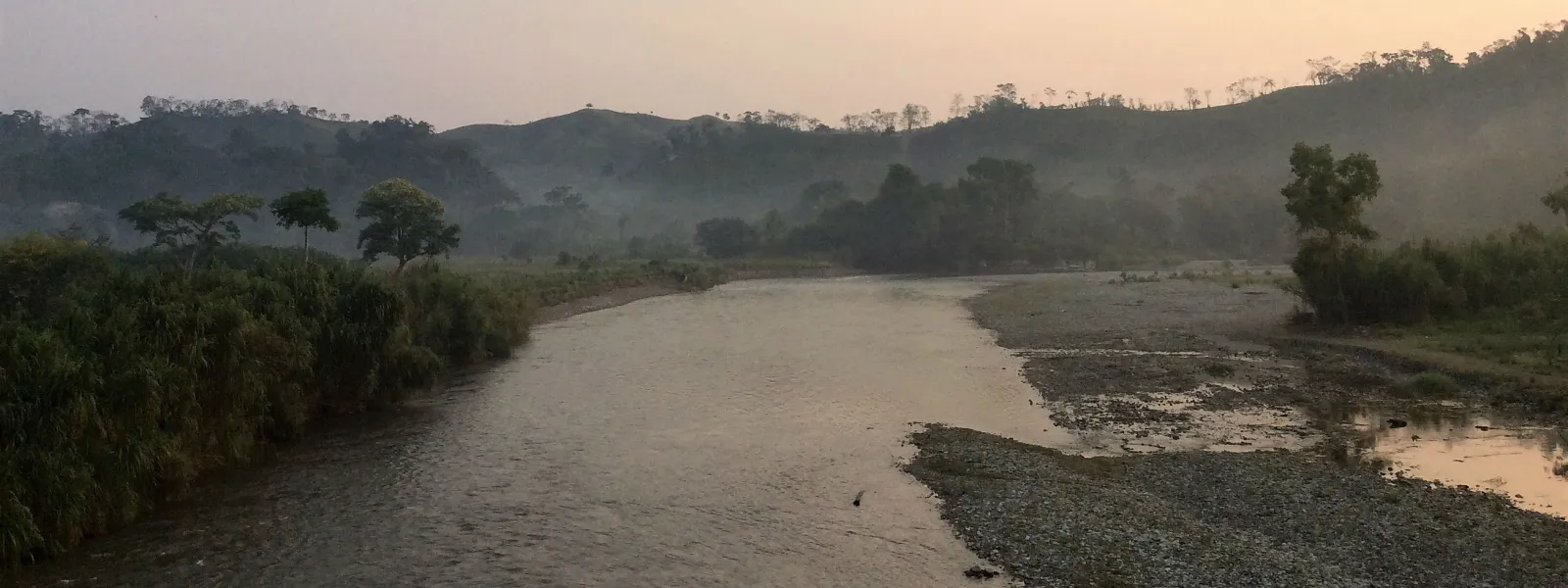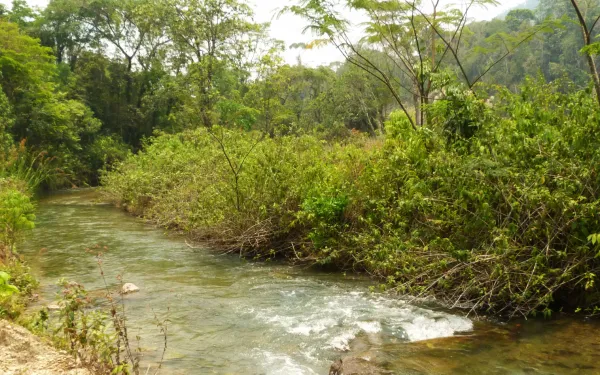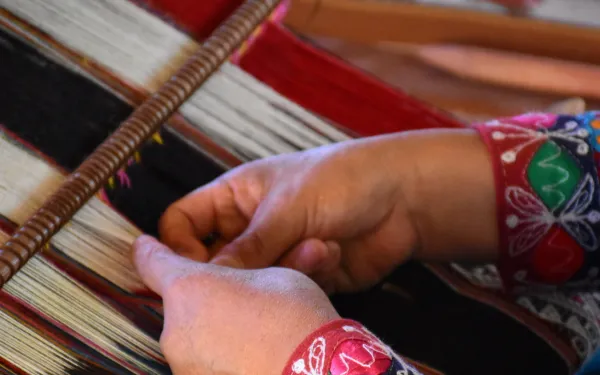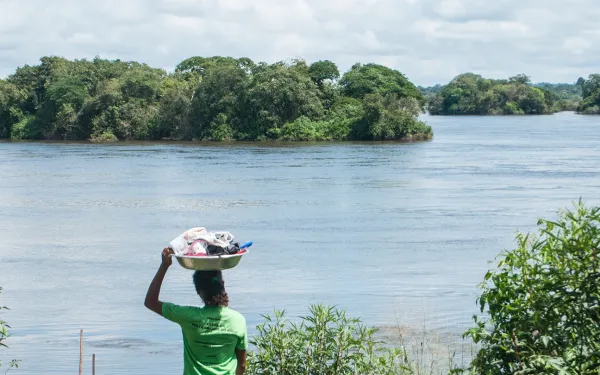
Project
Liliana Ávila /AIDAMayan women’s struggle before the Inter-American Development Bank in Guatemala
Mayan communities succeeded in getting the IDB Invest to develop a responsible exit plan after withdrawing its financing for two hydroelectric projects that negatively impacted ecosystems and the livelihoods of indigenous peoples, especially women, in the micro-region of Yichk'isis (Ixquisis).
In the struggle to defend their water, territory and way of life, indigenous Mayan communities in the Yichk'isis (Ixquisis) micro-region of northern Guatemala convinced the Inter-American Development Bank Group to withdraw its financing of two hydroelectric dams whose implementation violated their rights. The decision was also significant in that the IDB, for the first time, designed a responsible exit plan.
That historic advance was the result of the complaint that the communities filed in August 2018—with the support of AIDA, the Plurinational Ancestral Government of the Akateko, Chuj, and Q'anjob'al Native Nations, and the International Platform against Impunity. The complaint was filed with the Independent Consultation and Investigation Mechanism (MICI), the IDB Group's accountability office.
In resolving the case in September 2021, the MICI concluded that IDB Invest failed to comply with its own operational policies and safeguards, in the framework of the financing granted to the company Energía y Renovación S.A. for the implementation of the San Mateo and San Andrés hydroelectric projects.
Learn more about this achievement
In the mountains of Northwestern Guatemala, near the border with Mexico, the land is rich and fertile. Several important rivers and many other water sources feed the soil.
The residents of these mountains, many indigenous women of Mayan descent, have long depended on the waters to nourish them, to provide them with fish, as well as for agriculture, sanitation, and cooking.
But the construction of the San Mateo and San Andres dams has caused water scarcity and the contamination of rivers and other natural resources long cherished by the communities.
The near lack of water has also drastically reduced harvests, lessening the income gained from selling corn, wheat, beans, coffee, sugar cane and other products in the market. As a result, the conditions of poverty in the area have deepened.
And the risk situation is profound, particularly for women, who have played a very important role in the defense of water and territory threatened by hydroelectric projects, and are therefore victims of intimidation and stigmatization.
As guardians of their land and water, they have come to its defense and they’ll continue to prevent environmental deterioration from further harming their families.
Read our fact sheet on the case

Related projects
Latest News

Historic recommendation paves the way for development bank to exit harmful hydroelectric projects in indigenous territory
For the first time, a case brought before the Inter-American Development Bank’s (IDB) Independent Consultation and Investigation Mechanism (MICI) opens the possibility for the bank to responsibly exit financing granted to hydroelectric projects, after concluding that the investment was made without acknowledging the presence of indigenous peoples, thus violating the bank’s operational policies. Washington DC, United States. The Independent Consultation and Investigation Mechanism (MICI) of the Inter-American Development Bank Group concluded that, within the framework of the financing granted to the Generadora San Mateo and Generadora San Andrés hydroelectric projects—located in the Yich K'isis micro-region, territory of the Native Maya Chuj Guatemala Nation—IDB Invest ignored the presence of indigenous peoples in the area by failing to verify their existence, thus ruling out the implementation of safeguards to protect them. MICI also established that the Bank failed to comply with several of its internal policies and, based on this, opened the possibility for a responsible withdrawal of the investment. These and other findings are contained in the case’s Final Report, approved by the IDB Board of Executive Directors, in which MICI resolved the complaint filed in 2018 by the affected communities—represented by the Ancestral Plurinational Government of the Maya Q'anjob'al, Maya Chuj, Maya Akateko, Maya Popti and Mestiza Native Nations; the Interamerican Association for Environmental Defense (AIDA); and the International Platform Against Impunity. Of the 29 recommendations issued in the report: 10 are aimed at institutional changes to avoid non-compliance with environmental and social safeguards in other IDB Invest operations; 18 are focused on implementing specific corrective actions to redirect the San Mateo and San Andrés projects; and one of them, number 29, opens the possibility for IDB Invest to withdraw its investment from the hydroelectric plants. "In case of exit from the Projects, IDB Invest should adopt the necessary provisions to ensure a responsible exit from Operations," the report reads. "Recommendation 29 is the most consistent with the findings of the Final Report and the one that best responds to the request that the communities have made since the beginning of the process: it is unsustainable for IDB Invest to finance projects that were developed in indigenous territories while ignoring their presence," said Liliana Ávila, senior attorney at AIDA. "In an effective accountability process, the bank must be held responsible for its mistakes and remedy the damage it has caused." This represents a milestone for the region, as it is the first time that MICI has made such a consistent recommendation regarding projects under investigation. The recommendation demonstrates improvements in the bank's accountability processes, increases opportunities for communities affected by IDB Group-financed projects, and sets a precedent for better financing practices. "The report sets a precedent for accountability in the region. It puts MICI and the compliance verification phase one step closer to responding to the requests and demands of affected communities," said Carolina Juaneda, Latin America Coordinator for the Bank Information Center. "Recommendation 29 is a novel and encouraging development, as it puts the requests and demands of the communities that have been negatively affected by the projects at center stage. Although there are still many challenges to continue working on, the report undoubtedly represents a clear and powerful step toward strengthening accountability in the region." For the communities, it is through full compliance with Recommendation 29 that their primary request may finally be answered. The bank’s divestment from the dams must incorporate a responsible, participatory and comprehensive withdrawal plan that respects the good faith consultation carried out in 2009, in which the communities decided not to carry out the such projects in their territory. The plan must include: 1) recognition and restoration of social and cultural damages caused; 2) respect for the rights of indigenous peoples and recognition and restoration of the damages generated; 3) recognition and restoration of the damages generated by the differentiated impacts on women; and 4) prevention, mitigation and restoration measures from an environmental perspective. "The measures proposed in Recommendation 29 should have been part of the project planning phase. By not having considered them in its initial phase, a series of impacts and damages to the community were generated," stated Mara Bocaletti, Regional Director of the International Platform Against Impunity. "Only a responsible exit process by the investors will be able to restore the conditions of credibility towards the accountability mechanisms of international financial institutions." Another of the communities' expectations is that the IDB Group will guarantee their access to information and participation in the following phases of the process, which would allow the effective guarantee of their rights and the improvement of the bank's protection strategies. "This report is very valuable because it recognizes the impacts generated by the projects and validates the complaints we have been making for years. It is an important report not only for us, but for all indigenous peoples in Guatemala," said Lucas Marcos, local authority. "The bank's responsible withdrawal from the projects will allow us to maintain our rivers and access to water for us and our families." In addition to non-compliance with the IDB's policy on indigenous peoples, MICI concluded that the development of the San Mateo and San Andres projects caused differentiated impacts on women, environmental impacts, increased conflict, and harm to the social fabric. It also found that the bank did not guarantee access to information for the communities. "It is a serious wrongdoing that the bank has prioritized the advancement of these projects despite failing to comply with its internal requirements, to the detriment of our life as communities and ignoring our presence as indigenous peoples," said Rigoberto Juarez, Coordinator of the Plurinational Government of the Maya Q'anjob'al, Maya Chuj, Maya Akateko, Maya Popti and Mestiza indigenous nations. "Our individual and collective rights cannot be undermined in the face of private interests; consequently, a responsible withdrawal is the least the bank can do in the face of the magnitude of the damages caused. We hope that this will not happen again in other cases, and that the bank will assume its responsibility to respect the rights of indigenous peoples." The outcome of this complaint, as well as the international attention surrounding the case, is the result of a process of organization and resistance undertaken by the Mayan men and women of Yich K'isis upon being faced with of the imposition of large-scale hydroelectric projects, developed without due diligence and without consultation. For years, they have been demanding respect for their ways of life, and the value they hold for their water and their culture. The MICI report, apart from supporting the allegations of the affected communities regarding the violations of their rights, also sets an important precedent for Guatemala. This decision should be taken into account on a national level to address the countless irregularities and rights violations denounced throughout the country in the context of the implementation of mega-development projects, specifically large dams. press contacts Victor Quintanilla (Mexico), AIDA, [email protected], +525570522107 Camila Castellanos, International Platform Against Impunity, [email protected]
Read more
The IDB's opportunity to support the protection of the environment and human rights
The Inter-American Development Bank Group (IDB Group) is uniquely positioned not only to support recovery efforts in Latin America and the Caribbean, a region hard hit by the pandemic, but also to do so with respect for people and the environment. The IDB Group—composed of the IDB, which works with governments; IDB Invest, which collaborates with the private sector; and IDB Lab, the bank’s innovation laboratory— is the continent's most important development financing entity. In 2020, it approved a record US$21.6 billion for its 26 member countries in the region. In addition to the challenge of leading the recovery of public finances, the current economic and social crisis represents an opportunity for the IDB Group to successfully face another major challenge: the adoption of operational policies that comply with international environmental and human rights standards, as well as improved accountability processes. This is fundamental to the role the Bank plays in the region, and has become even more relevant in the current context: Regarding accountability and the evaluation of its current policies, it is important to consider that four hydroelectric projects financed by the IDB Group are or have been under scrutiny by the IDB's Independent Consultation and Investigation Mechanism (MICI) due to the impacts caused by their implementation in indigenous and rural communities in Guatemala, Chile and Colombia. These projects, financed by IDB Invest, have affected the livelihoods of those who live in their shadow. AIDA—together with the International Platform Against Impunity and the Plurinational Government of the Q'anjob'al, Chuj, Akateko, Popti and Mestiza Nation—has supported members of the Mayan communities of the Ixquisis micro-region in Guatemala in the face of the destruction caused by two of these projects: the San Mateo and San Andres dams. Personally, I’ve seen first hand the damages caused to the indigenous population. I’ve heard the fear and uncertainty in the voices of local women as they explained how their rivers were polluted, their children fell ill, and their lives forever changed. “One day we will run out of water and we won’t be able to live,” a female indigenous leader from Ixquisis told me. “Our children will suffer.” The women of Ixquisis have played a central role in the complaint presented before MICI, as a primary question at play centers on the supposed violation of the Bank’s operational policy on gender, which recognizes that development projects often have differential impacts on local women. For the women, the rivers are a vital element, since they enable access to fresh water and food, also playing a key role in their interactions with each other. In the complaint, affected communities also denounced the projects’ lack of compliance with the Bank’s operational policies indigenous rights and the environment, and for the resulting damages. They argue that the company implementing the San Mateo and San Andrés dams acted without due diligence and violated the right to consultation and the free, prior and informed consent of affected indigenous peoples. In fact, the implementation of the projects actually ignored the results of a good faith consultation, carried out in 2009, in which the majority of the local population decided they did not consent to the implementation of such mega-projects in their territory. What’s evident is that the Bank’s capacity to supervise the projects it finances is limited and, despite meeting minimum standards, its operational policies are often ineffective. What’s more, spaces in which the Bank verifies compliance are reduced and the consequences for that non-compliance, uncertain. Earlier this year, MICI published a report on Chile’s Alto Maipo hydroelectric project, finding that the dam violated several operational policies, including that on gender. Yet that report has come under scrutiny for failing to offer restitution measures for the ongoing damages incurred by affected communities. In the coming months, the preliminary report on the Ixquisis case will be released. Affected communities hope that the recommendations it holds are reflective of the realities on the ground, and oriented toward the adoption of corrective measures, including the immediate divestment of financing. With this case, the Bank has a key opportunity to demonstrate its commitment to accountability, as well as its openness to assess compliance with its own operational policies and to remedy the damages that failure to comply has caused to vulnerable groups. It’s also an opportunity for the entity to take preventive measures and lay the groundwork for changing its practices. When he was elected president of the institution, Mauricio Claver-Carone promised to "act on priority issues in the region.” This includes an evaluation of any global context that affects the very development the IDB Group seeks to promote. These days, that includes not just the current public health crisis, but also the global climate crisis, the serious situation facing environmental defenders, and resolving a number of pending complaints on gender equity and respect for indigenous rights. The actions taken by the IDB Group as a result of the Ixquisis case may be the first step in establishing a fundamental precedent for the protection of human rights and the environment among international financial institutions, a contribution that is undoubtedly as, if not more, valuable than the economic one.
Read more
Human Rights Council addresses the water crisis and environmental defenders protection
The 46th session of the United Nations Human Rights Council is the first to be held entirely online, due to the COVID-19 pandemic. It runs until March 23. The virtual format of this HRC session enabled AIDA to make our first participation ever in the HRC and join the discussions on two of the topics that are at the core of its human rights work: the right to a healthy environment and the protection of environmental human rights defenders. On 03 March, the Special Rapporteur on Human Rights and the Environment, David Boyd, presented his report “Human Rights and the Global Water Crisis” to the Human Rights Council. In it, Boyd highlighted the severe impacts of water pollution, water scarcity and water-related disasters on the rights to life, health, education, food, development and the right to a healthy environment. He also emphasized that climate change is a risk-multiplier, exacerbating water-related human rights issues. The Special Rapporteur called on States to incorporate a rights-based approach in both their climate strategies and water plans. Finally, Boyd reiterated his call for the Human Rights Council to support the initiative for a resolution to recognize that everyone everywhere has the right to live in a safe, clean, healthy and sustainable environment. In the Interactive Dialogue that followed Boyd’s presentation, AIDA Attorney Rosa Peña denounced the negative impacts of mega-dams, coal mining and fracking on human rights and water access in Latin America. She noted that these projects not only threaten the human rights of local communities but also exacerbate the climate crisis. She called the attention of the Special Rapporteur to the communities affected by the Belo Monte mega-dam in the Brazilian Amazon. Currently, implementation of the so-called ‘Consensus Hydrogram’ in the Xingu River threatens the lives of local communities, pollutes the water, dries up the river and causes food insecurity and severe biodiversity loss. On March 4, it was the turn of the Special Rapporteur on Human Rights Defenders, Mary Lawlor, to engage in an Interactive Dialogue on ”Final warning: death threats and killings of human rights defenders” She concluded that lack of political will is one of the reasons why various States fail in their moral and legal obligation to protect Human Rights Defenders, and therefore called for more effective responses to the threats against them. Representing AIDA in the Interactive Dialogue, Attorney Marcella Torres highlighted that Latin America is the most dangerous region in the world for environmental human rights defenders and urged all States to actively protect them. She turned the spotlight on the situation of environmental defenders in Brazil, Guatemala and Colombia, where the invasion of indigenous lands, mega-dams and fracking are closely related to the increase in violence against defenders. She concluded by reminding States that the protection of environmental defenders should promote the recognition of the right to a healthy environment, and provide guarantees so that all people are free to exercise their right to defend human rights. See AIDA’s contributions in the Interactive Dialogues in full:
Read more